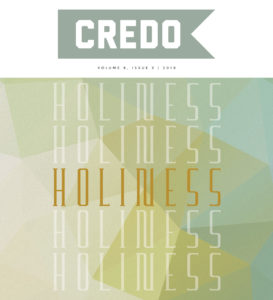That the Puritans were known for their emphasis on holiness is no surprise; they were branded by this pejorative term because others perceived them as holier-than-thou types who walked around with their noses turned up, pointing their fingers at sinners and making ridiculous rules against good things. Though this stereotype persists today among churchgoers, students, and even professors, it no longer holds any weight in the world of Puritan scholarship. One of the leading defenders of the Puritans, J. I. Packer, explains in A Quest for Godliness that the Puritans developed a holistic lifestyle that centered around holiness “not so much to keep bad things out as to make sure that they got all good and important things in” (24). Thus, one way the Puritans can help Christians today mature in their understanding and practice of holiness is by showing how holiness is not primarily a negative or limiting thing that drags one down to an ignoble existence in the depths of despair, but primarily good in its source, the attitudes and actions it results in, and even the personal and communal benefits it brings.
Holiness Comes From a Good God
First, holiness comes from God, who is good. In The Crown and Glory of Christianity, or, Holiness, the Only Way to Happiness Thomas Brooks explains, “God is essentially holy, and in this sense, none is holy but himself . . . Holiness in God is not a quality but his essence.” (4:392–393). God is holy in that he is both transcendent (i.e., in a separate category from creation), as well as morally pure. Thus, Brooks further describes, “God is so holy, that no iniquity can be found in him; there is no defect nor default in the nature of God” (4:393).
Though we cannot be holy like God in his transcendence, we must be like him in his moral purity since he commands it. The best way to understand how we can be holy is by looking at Christ. First, we are connected to divine holiness through our union with Christ, who is God incarnate. Second, we are given an example of how to be holy as human beings since Christ is fully or truly human and perfectly obeyed the law. God does the first by the power of the Holy Spirit, and this enables us to do the second with the Spirit’s help.
Holiness is Loving and Imitating Christ’s Goodness
Before we can imitate Christ, we must love him and his goodness. Walter Marshall argues in The Gospel Mystery of Sanctification that the Christian wanting to grow in holiness must love Christ as “only good, the fountain of all goodness” (23). Similarly, in his Christologia John Owen says, “no soul can have a design of conformity unto Christ but his who so likes and loves the graces that were in him” (1:173). In fact, when we cling to Christ in love, we “thereby derive transforming virtue from him” since “every approach unto God by ardent love and delight is transfiguring” (3:585).
Owen and Brooks identify the same characteristics of Christ’s holiness for us to imitate, including meekness, zeal, patience, faith, fear, self-denial, heavenly-mindedness, compassion, and love; some in relation to our Heavenly Father, some to ourselves, and some to other people. For example, Owen says that Christ’s “meekness, lowliness of mind, condescension unto all sorts of persons—his love and kindness unto mankind—his readiness to do good unto all, with patience and forbearance—are continually set before us in his example” (1:175). Overall, Owen lumps these characteristics under the general category of divine goodness, and Marshall says they are good in their own nature. Imitating Christ’s goodness will manifest itself through outward actions, but it must start in the heart. Click To Tweet
Imitating Christ’s goodness will manifest itself through outward actions, but it must start in the heart. Actually, Owen argues, the person who is “proud, wrathful, envious, bitterly zealous, calling for fire from heaven to destroy men, or fetching it themselves from hell,” cannot be holy even if doing charitable acts because holiness and this attitude are mutually exclusive. A holy person is rather
meek, humble, kind, patient, and useful unto all; [one] that condescends to the ignorance, weaknesses and infirmities of others; that passeth by provocations, injuries, contempt, with patience and with silence, unless where the glory and truth of God call for a just vindication; that pitieth all sorts of men in their failings and miscarriages, who is free from jealousies and evil surmises; that loveth what is good in all men, and all men even wherein they are not good, nor do good (1:175).
Holiness Brings Good Benefits
As implied above, holiness even brings good benefits to us and those around us. Thus, Owen argues that God’s command to be holy is not only an effect of his authority we must submit to, but a “fruit of infinite wisdom and goodness also, which is our highest advantage and interest to comply with” (3:616). Brooks shows the absurdity and selfishness of thinking that sin will bring more happiness than holiness by articulating the excuses of hypothetical nay-sayers. “But,” they protest, “if we should . . . pursue after holiness, then we must take our farewell of all joy and comfort, of all delight and pleasure, and never expect to enjoy one merry day more” (4:249). Maybe we would labour after holiness, but “then we must resolve to be poor, and mean, and beggarly in the world . . . for we shall . . . never grow rich and great . . . by godliness” (4:300). This is really too much to ask; “it would be a disgrace, a disparagement, and dishonour to us [since] we are gentlemen, . . . well-bred and high-born” (4:307).
Clearly, when compared to Christ’s life, this kind of life only leads to misery, poverty, and shame because it is not good. It is both better and more satisfying to be holy because true goodness and happiness can only come from communion with God, and we must be holy in order to have that. Moreover, Brooks argues, holiness brings honour, being the “true gentility and true nobility of the soul,” and will make you “beautiful and amiable” as well as “gainfull” in the most important aspects of life (4:159, 171–173). Holiness even benefits those around you by drawing them to Christ and conversion, and contributing to the common good. These are the obvious effects of a holy life, which Owen describes as being “read[y] to do good, to forgive, to help and relieve, and this towards all men, on all occasions” (3:586). Brooks sums up the communal benefits of holiness by saying, “the more holiness any man attains to, the more serviceable and useful he will be in his generation” (4:362).
If what is good seems bad, what is honorable seems dishonorable, what is holy seems earthly, and what is pleasant seems puritanical, it is because Christ’s way turns the world’s way upside down. Rather than being the dull lifestyle it is often portrayed as, holiness is really the best way to live because it comes from a good God, results in good attitudes and actions, and even brings good benefits to you and those around you.


